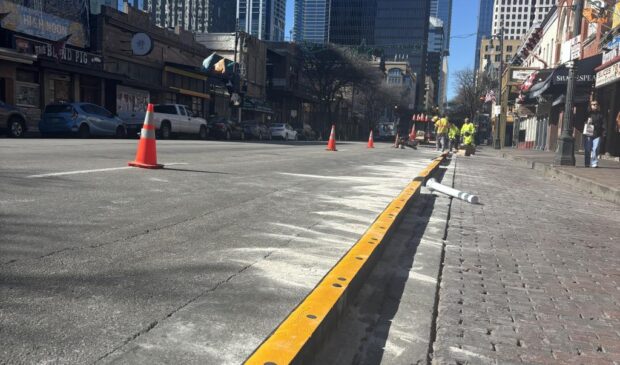Downtown Commissioners weigh in on Sixth Street plan
Friday, January 17, 2025 by
Elizabeth Pagano Hours after the announcement that Austin will be opening Sixth Street to vehicular traffic on weekend nights, the Downtown Commission had a chance to weigh in.
Austin Police Chief Lisa Davis and APD Lieutenant Christopher Juusola, who is the downtown operations director for the city, filled commissioners in on the current and planned state of things in the beleaguered entertainment district, which has recently been a focus for the commission.
“When it comes to Sixth Street, this truly is about safety. And I think getting people off of the middle of the street, unless there were structures or infrastructure in place to block a vehicle intrusion, that this is the safest thing to do,” Davis said.
“Certainly, the New Orleans incident has escalated the need, and I think that it has quite clearly shown how these things can happen and how the Meridian barricades can help,” she continued. “I want to thank you for your leadership and truly recognizing, for a very long time, that these were needed. I’m happy to report that all is coming to fruition.”
Commissioners had, in fact, planned to vote on a resolution asking City Council to purchase 65 Meridian barricades but opted to table the resolution since funding has now been secured as part of the new plan for Sixth Street.
“The city heard us, the Council acted and barricades – actually more than we had in our recommendation – have been purchased,” Chair August Harris said. “I think it shows that this commission has impact. We brought light to an issue, and it took a while, but with our friends at the Public Safety Commission we have been able to have some effect.”
Juusola noted that the city has plans to use the barricades for other purposes, like events and construction, in the future.
During their discussion, commissioners asked questions about the future of Sixth Street and about how reopening the street would look.
Commissioner Peter Breton said that he understood the change, given the alcohol-heavy nature of the area currently, but asked whether, if the makeup of the businesses along the street were to change in the future as planned, reinstating a pedestrian-only Sixth Street was on the table.
“Sixth Street is one of the very few, I would say, lively areas of town. Unfortunately, the liveliness comes with difficulty and crime and bad behavior,” Breton said. “I’m hoping we can move towards putting in permanent infrastructure to pedestrianize that area and, frankly, other areas of downtown.”
Juusola agreed, saying talks were in progress to determine the future of the street, but clarified that the current change was only a temporary solution.
“I’m not sure if the pedestrianization is the goal of this,” Juusola said. “What we have currently is not safe, and it hasn’t been safe. The only thing we’ve had is those plastic visual deterrents, and anybody could have come in there and taken out a lot of people.”
“I really feel like moving people out of the street to where they should be, on the sidewalk, and giving them a wider sidewalk is the safer choice here,” he continued. “I’m not trying to reduce the number of people that could be in an area by any means and I would agree that having a more vibrant community with different businesses is the way to go here.”
In terms of transportation, Juusola confirmed that they were ongoing discussions about limiting electric scooters, though limiting pickups and drop-offs with ride-share companies would prove more complicated.
“There are plans to communicate with the different companies,” Juusola said. “The problem that we have is that there’s state law that says we can’t regulate what they do. … Realistically, we know people do whatever they want sometimes.”
In order to gauge the success of the switchover, the city will employ analysts that will look for changes in violent crime, property crime and collision rates. The analysts will also study the economic impact on businesses in the area.
“We have this street party that happens every single weekend at nighttime,” said Juusola, who pointed out the fights that accompany the party and how the effort was to “change that environment.”
“We don’t want people hanging out in the streets, fighting,” he said. “We do want people going from business to business enjoying different types of businesses downtown, not just shot bars.”
This story was produced as part of the Austin Monitor’s reporting partnership with KUT.
The Austin Monitor’s work is made possible by donations from the community. Though our reporting covers donors from time to time, we are careful to keep business and editorial efforts separate while maintaining transparency. A complete list of donors is available here, and our code of ethics is explained here.
You're a community leader
And we’re honored you look to us for serious, in-depth news. You know a strong community needs local and dedicated watchdog reporting. We’re here for you and that won’t change. Now will you take the powerful next step and support our nonprofit news organization?



